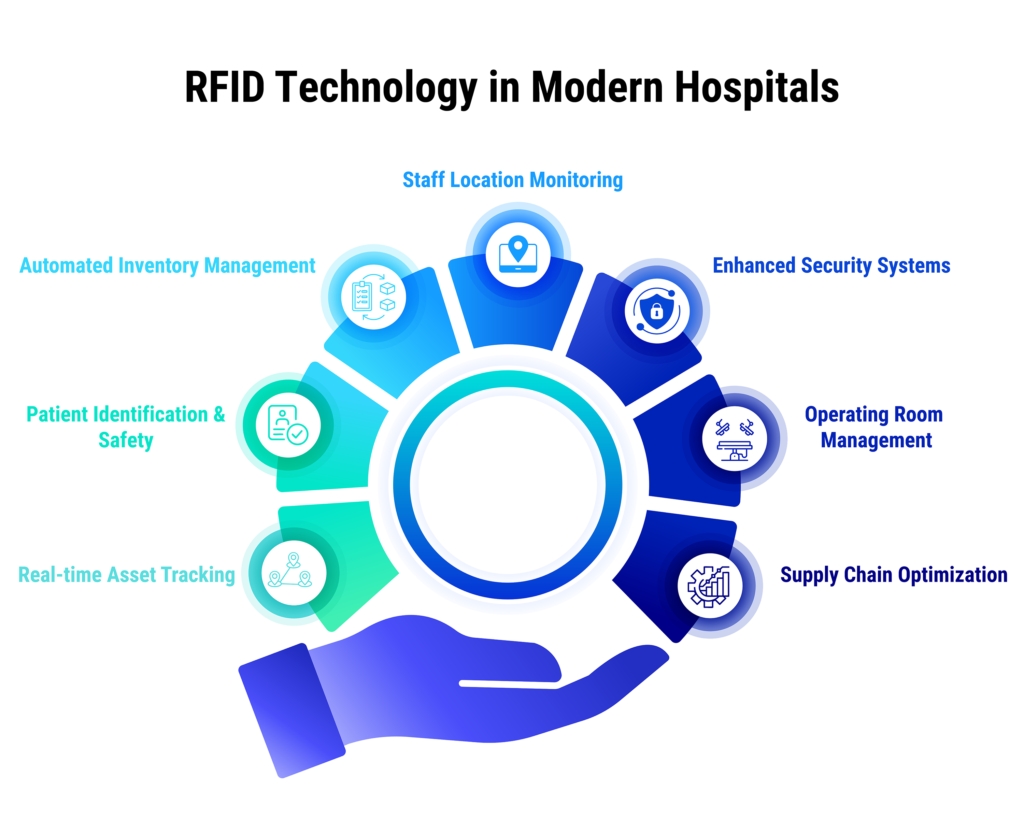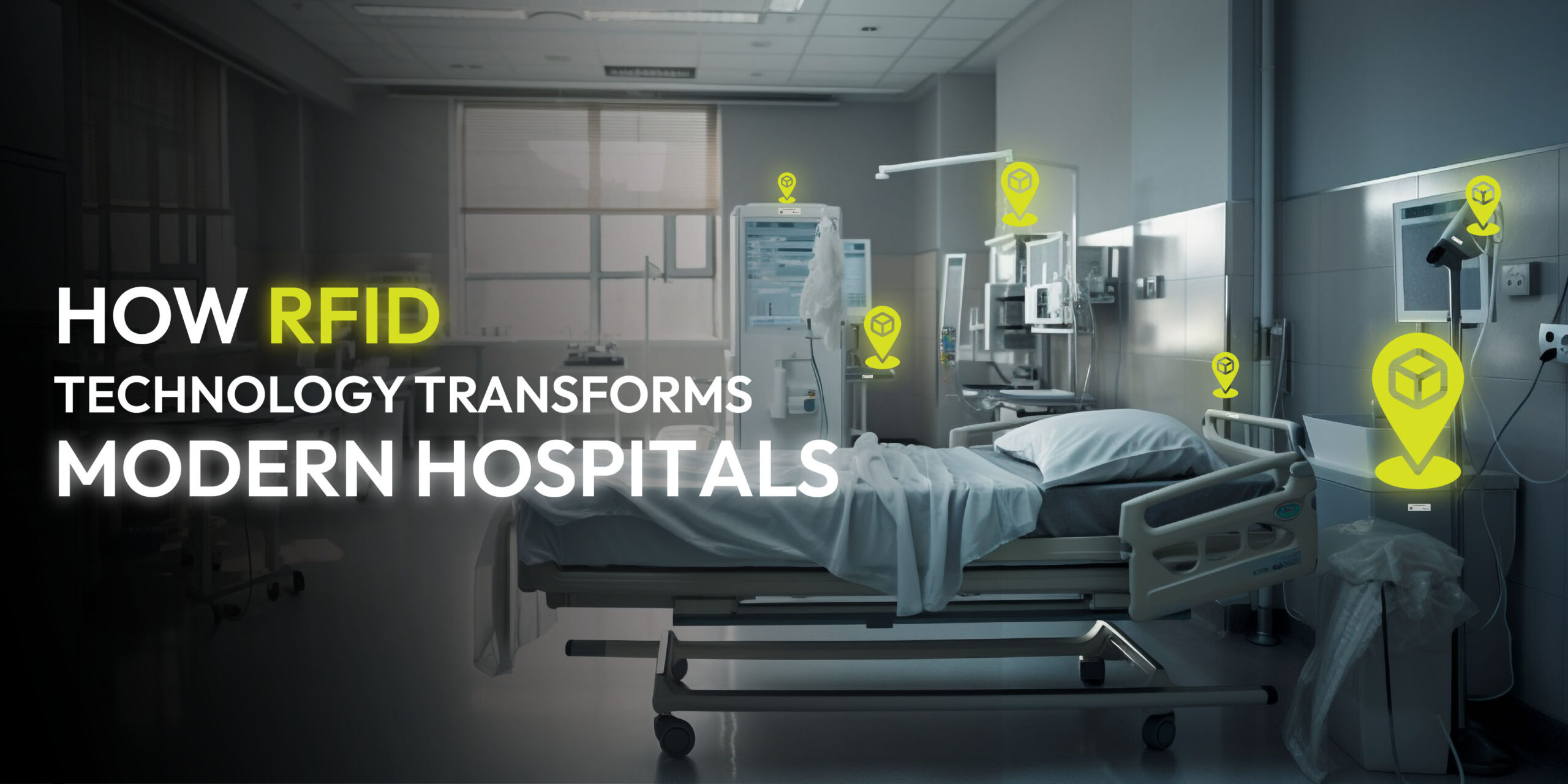A silent revolution is taking place in the bustling corridors of modern hospitals. It’s not flashy robots or shiny new MRI machines leading this change, but rather a small, unassuming technology making waves in healthcare: Radio Frequency Identification (RFID). This powerful tool is reshaping how hospitals operate, enhancing patient care, and streamlining processes in ways that were once thought impossible.
The Silent Revolution in Healthcare
Hospitals are complex ecosystems where efficiency can mean the difference between life and death. In this high-stakes environment, RFID technology is emerging as a game-changer. By providing real-time tracking and data collection, RFID is helping hospitals reduce errors, save time, and ultimately, save lives.
Decoding RFID
But what exactly is RFID? At its core, RFID is a technology that uses radio waves to identify and track objects. An RFID system consists of three main components: tags, readers, and a data management system. RFID tags are attached to objects (medical equipment) and contain information about them. Readers pick up the signals from these tags, and the data management system processes and stores this information.
Unlike traditional barcodes, RFID doesn’t require line-of-sight to work, can read multiple tags simultaneously, and can store more data. This makes it incredibly versatile and powerful in a hospital setting.

Asset Tracking and Management
One of the most significant impacts of RFID in hospitals is in asset tracking and management. Let’s break this down:
Equipment Tracking
2. Improved Utilization Rates: RFID systems provide data on equipment usage patterns, helping hospitals optimize resource allocation. This insight allows for better distribution of equipment across departments, potentially reducing unnecessary purchases and improving overall efficiency.
3. Theft Prevention: RFID tags act as a security measure for valuable medical equipment. They can trigger alarms if items leave designated areas, deterring theft and unauthorized removal. This helps hospitals maintain their inventory and reduce financial losses.
Inventory Management
1. Automated Stock Monitoring: RFID automates the tracking of medical supplies, providing real-time, accurate data on stock levels. This eliminates manual counting errors, ensures timely reordering, and helps maintain optimal inventory levels across all hospital departments.
2. Reduced Waste and Expiration: RFID systems can track expiration dates of medical supplies, alerting staff when items are nearing expiry. This feature minimizes waste, ensures patients receive fresh supplies, and helps hospitals maintain regulatory compliance.
3. Just-in-Time Ordering: With real-time inventory data from RFID systems, hospitals can implement just-in-time ordering. This reduces the need for large storage areas, minimizes overstocking, and optimizes cash flow by ordering supplies only when needed.
Patient Safety and Care
RFID technology is not just about managing things; it’s also revolutionizing patient care:
Patient Identification and Tracking
Reducing Medical Errors: RFID wristbands can store crucial patient information, reducing the risk of misidentification and associated errors.
Streamlining Admissions and Transfers: RFID streamlines the admission and transfer process, ensuring that patient information moves seamlessly between departments.
Administration of Medication
Ensuring Right Patient, Right Medication, Right Dose: RFID helps verify that the right patient is receiving the right medication at the right dose, significantly reducing medication errors.
Tracking Drug Interactions and Allergies: RFID systems can automatically check for potential drug interactions or allergies, adding an extra layer of patient safety.
Infant Protection in Maternity Wards
RFID tags on infants and mothers help prevent mix-ups and unauthorized removals from the maternity ward, providing peace of mind for new parents and staff alike.
Optimization of Workflow
RFID is also transforming how hospitals manage their workforce and processes:
Staff Tracking and Management
Optimizing Staffing Levels: By tracking staff movements, hospitals can identify peak times and areas, allowing for more efficient staff allocation.
Improving Response Times: In emergencies, RFID can help quickly locate the nearest qualified staff member, potentially saving crucial minutes.
Automation of Processes
Reducing Paperwork: RFID automates many documentation processes, freeing up staff to focus more on patient care.
Streamlining Patient Flow: From admission to discharge, RFID helps optimize patient movement through the hospital, reducing wait times and improving satisfaction.
Infection Control: The Invisible Guardian
In the era of global pandemics, infection control is more critical than ever. RFID is stepping up to the challenge:
RFID-Powered Hand Hygiene Monitoring
RFID badges can track when staff use hand sanitizing stations, encouraging better hygiene practices and reducing the spread of infections.
Tracking Sterilization: Ensuring Squeaky-Clean Instruments
RFID tags on medical instruments can verify that they’ve gone through proper sterilization processes, reducing the risk of infections.
Contact Tracing: Containing Outbreaks Before They Begin
In the event of an outbreak, RFID data can quickly identify who might have been exposed, allowing for rapid containment measures.
Analyzing Data and Making Decisions
The wealth of data generated by RFID systems is a goldmine for hospital management:
Real-Time Data Collection and Analysis
RFID provides a constant stream of data about hospital operations, allowing for real-time analysis and decision-making.
Identifying Bottlenecks and Inefficiencies
By analyzing RFID data, hospitals can identify and address inefficiencies in their processes, leading to smoother operations.
Improving Resource Allocation
Data-driven insights help hospitals allocate resources more effectively, potentially leading to significant cost savings.
Challenges in RFID Implementation
Implementing RFID in hospitals faces hurdles such as staff resistance to change and the need for comprehensive training. Balancing technological efficiency with compassionate care is crucial. Overcoming these challenges requires clear communication, robust training programs, and a commitment to maintaining the human touch in healthcare.
Future Trends and Possibilities
The future of RFID in healthcare is bright. We’re likely to see integration with other technologies like AI and IoT, leading to even smarter hospitals. Wearable RFID devices could revolutionize patient monitoring, and the technology could expand beyond hospital walls into home healthcare settings.
Conclusion
RFID technology is indeed transforming modern hospitals, touching every aspect from asset management to patient care. While challenges exist, the potential benefits in terms of efficiency, safety, and quality of care are immense. As we move forward, RFID will undoubtedly play a crucial role in shaping the future of healthcare, creating smarter, safer, and more efficient hospitals for all.
RFID4U stands at the forefront of healthcare innovation, delivering comprehensive RFID solutions that transform hospital operations. Their expertise helps healthcare facilities optimize asset tracking, enhance patient safety, and streamline inventory management, ultimately leading to improved patient care and operational efficiency.
